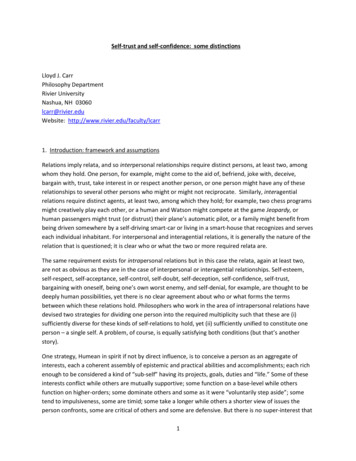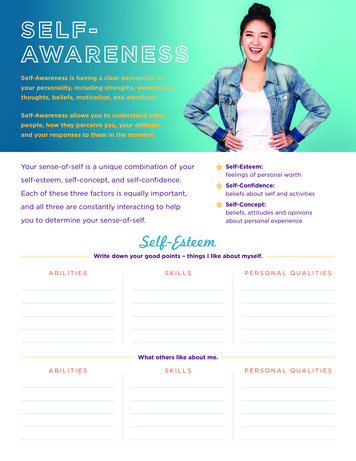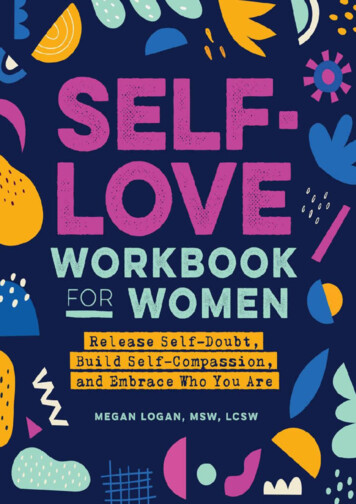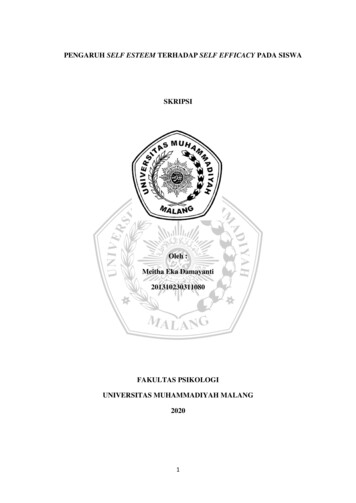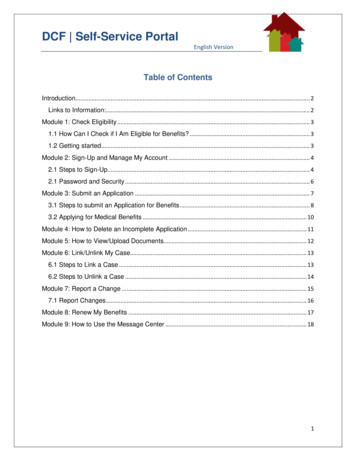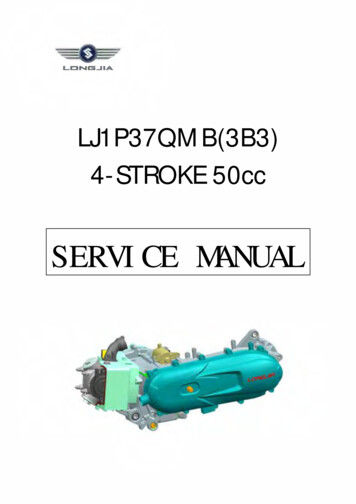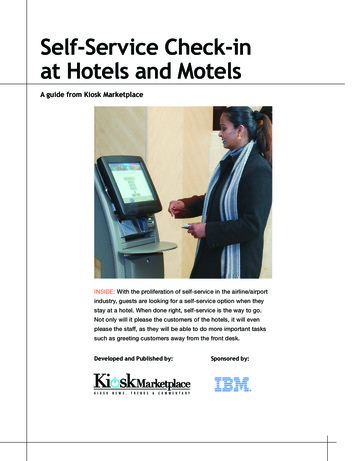
Transcription
Self-Service Check-inat Hotels and MotelsA guide from Kiosk MarketplaceINSIDE: With the proliferation of self-service in the airline/airportindustry, guests are looking for a self-service option when theystay at a hotel. When done right, self-service is the way to go.Not only will it please the customers of the hotels, it will evenplease the staff, as they will be able to do more important taskssuch as greeting customers away from the front desk.Developed and Published by:K I O S KN E W S ,T R E N D S&C O M M E N T A R YSponsored by:
Contents:Page 4IntroductionPage 6Chapter 1Self-Service Check-in at Hotels and Motels A short history of hotel self-serviceThe beginningTwo powerful solutions for hotel check-inTravel industry as a whole sees technology use increasePage 15Chapter 2 Make sure it does the right thingCustomer attitudesRecent trendsWhat’s in the box?Providing something specialPage 19Chapter 3 Make sure it works, all the timePage 21Chapter 4 Give it a face everyone’s mother could lovePage 23Chapter 5 Put it in the right spotSignage to promote check-in and other hotel amenitiesThree tips for placing a kioskPage 28Chapter 6 Help the staff learn to love itPage 33Chapter 7 Case Study: Hilton HotelsPage 37Appendix Further reading2
Sponsors: Self-Service Check-in at Hotels and MotelsAbout the sponsorK I O S KN E W S ,T R E N D S&C O M M E N T A R YK I O S K N E W S , T R E N D S & C O M M E N TA R YIBM Corp. is a leader in the development of innovative customer-facing self-service applications, offering integration and consistency across kiosk, Weband wireless channels. The company is a pioneer inhotel/motel check-in. IBM worked with several majorhotel chains including Hilton, Starwood and Marriottafter the turn of the 21st century to provide self-service solutions to those hotels’ customers. More than8,000 IBM e-access kiosks are installed worldwide.With 17 years in the self-service business, IBM hasexperience in the travel and transportation, government, utilities, finance and retail industries.Kiosk Marketplace, owned and operated byLouisville, Ky.-based NetWorld Alliance, is theworld’s largest online provider of information aboutand for the kiosk industry. The content, which isupdated every business day and read by businessand industry professionals throughout the world, isprovided free of charge to readers.Published by NetWorld Alliance. 2008 www.networldalliance.comAll photos courtesy of IBM Corp. and Hilton Hotels unless otherwise specified.Written and edited by Patrick Avery, Kiosk MarketplaceDick Good, CEOTom Harper, president and publisherBob Fincher, executive vice president and general manager, Technology DivisionJoseph Grove, vice president and associate publisher3
Introduction: Self-Service Check-in at Hotels and MotelsThe last time I walked into a hotel, thelobby was cluttered with tired tourists and befuddled business travelers.The hotel, at an upscale casino in LasVegas, looked like a zoo where thezookeeper had gone AWOL.a high premium to stay at anexpensive establishment, but inthe end you get very little buckfor buck.This hotel’s queue line for check-inswerved back and forth, resulting in aminimum 30-minute wait for the manyindividuals that had just arrived aftera day-long plane ride. With changeclanking in their pockets, many of themjust wanted to hit the slots and blackjack tables. Instead, they were stuck ina procession that seemed to go nowhere.But if you talk to the industryexperts, and even many business and other savvy travelerswho have experience with selfservice, they will say, when doneright, self-service is the way togo. Not only will it please thecustomers of the hotels, it willeven please the staff, as they will beable to do more important tasks suchas greeting customers away from thefront desk.Unfortunately, this scene has beenall too commonplace in the hospitality industry. Hotels and motels, smalland large, have been congested withguests wanting to check in after longdays of travel.The following research guide will giveyou insight into hotel/motel check-inself-service. It’s designed to give youthe five most important things you needto know to have a successful kioskdeployment.Despite the chaos, these hotels oftenare competent businesses. They havea capable staff and excellent facilities.But in today’s service-first environment,many are missing one important ingredient — self-service kiosks.There also will be examples fromseveral hotel chains who have implemented self-service successfully. Theyeven talk about some of the things theyIt’s not too hard to imagine that manyof these hotels are fearful of self-service. There have been cries by manythat self-service will replace the hardworking individuals that work in thehospitality business. Other critics havesaid that self-service is really no service at all; therefore, you are payingA guide from Kiosk Marketplace Patrick Avery,editor of Kiosk MarketplaceWhen done right, self-service isthe way to go. Not only will itplease the customers of the hotels,it will even please the staff, asthey will be able to do more important tasks such as greeting customers away from the front desk.Self-Service Check-in at Hotels and Motels Sponsored by IBM Corporation
Introduction: Self-Service Check-in at Hotels and Motelsdid wrong and how they fixed them.After reading this guide, the basicsto deploying a kiosk in the hospitalityenvironment should be clear.I’d like to thank IBM, whose sponsorship of this guide enables us to provideit to you at no charge.A guide from Kiosk Marketplace Self-Service Check-in at Hotels and Motels Sponsored by IBM Corporation
Chapter 1: A short history of hotel self-serviceThe hotel industry is constantly changing. New hotel brands are emergingto target specific age groups andlifestyles. Boutique hotels focus onhigh-end brand messaging, luxuriousamenities, chic décor and hip cocktaillounges. Extended-stay hotels focuson low cost, business traveler essentials, comfort and security.Within this changing landscape, hotelsare looking to differentiate their brand.Understanding and satisfying guests’needs is at the heart of a great marketing vision. One of the differentiatorsis self-service. With the proliferation ofself-service in the airline/airport industry, guests are looking for a self-service option when they stay at a hotel.“Many people have already beenexposed to it in many forms,” saidRobert Chan, practice leader for IBMCanada’s e-access solutions. “Thenatural evolution is to extend it to hotelservices and give the guest choiceand control.”The beginningSelf-service in a hotel is not new.It has been around in the hospitality industry for some time and hasshown up in many different forms. Inits earliest days, public phones, housephones and vending machines servedas self-service devices.Many argue, however, that the dawnof automated self-service, in general,came at the advent of the automatedteller machine. ATMs, which allowedA guide from Kiosk Marketplace The introductory screen of a hotel check-in kiosk greets customersand tells them to simply touch the screen to begin the transaction. IBM has morethan 8,000 IBM kiosks installed or on order at more than 200 locations worldwide.customers to deposit checks andwithdraw significant sums of money,became the defining device for whatpeople called “self-service.”In the mid- to late 1980s, NCR Corp.first delved into the hotel self-servicearena, by placing ATMs in the hospitality environment. The ATM, which iswhat NCR was most known for, hadbeen out only for a short time; therefore, many people were unfamiliar withself-service technology, said ClydeDishman, NCR’s director of hospitalityindustry marketing.Back in those days, self-service evenfrightened people, he said. ATMs wereknown for taking people’s credit cardsand “eating them,” Dishman said.“Some people didn’t want to use thembecause they might be traveling anddidn’t want to lose their credit card. SoSelf-Service Check-in at Hotels and Motels Sponsored by IBM Corporation
Chapter 1: A short history of hotel self-servicewe had to change the card reader andmake some adjustments there.”So NCR’s first involvement with selfservice in the hospitality space wasnot an overwhelming success. However, NCR got involved in it again in2000, before the airlines and the travelindustry really embraced self-serviceat a high level. But this time, sincepersonal computing and Internet usewere at all-time highs, people’s ability to use self-service machines andkiosks really took off.“It just seemed to kind of fit well withwhat everyone else was doing in thetravel area,” Dishman said. “It gavehotels the option to give customersbetter service.”Two powerful solutions for hotelcheck-inIBM Corp. also was a pioneer in hotel/motel check-in. IBM worked withseveral major hotel chains includingHilton, Starwood and Marriott after theturn of the 21st century to begin providing self-service solutions to thosehotels’ customers.More than 8,000 IBM e-access kiosksare installed worldwide. With 17 yearsin the self-service business, IBM hasexperience in the travel and transportation, government, utilities, financeand retail industries.IBM’s hardware ranges from custom,self-service kiosks for online transaction processing, to wireless, handheldA guide from Kiosk Marketplace “Delivering multichannel self-service isthe future in the hotel industry. Build thebusiness logic once and deliver it acrossa variety of touch points that suit yourguests’ needs.”— Robert Chan,practice leader for IBM Canada’s e-access solutionsdevices. IBM’s team has developed asuite of software and hardware products that allows IBM to deploy selfservice solutions quickly and reliably.These solutions are both conventionaland Web-based.IBM’s S series kiosks were designedspecially for the hospitality industry.This particular kiosk runs applications such as hotel check-in/check-outand comp redemption for casinos.Standard devices include motorizedcard reader and room key encoderand thermal printer. Optional devicesinclude barcode scanner, room keydispenser, signature capture pad andchip and PIN reader.Servicing the largest customers in thehospitality sector, IBM has deliveredsolutions across the travel and transportation industry. In the past, IBM hashelped lead the development of the International Air Transport Association’sCommon Use Self Service (CUSS)standard, enabling airlines and airports to enhance the guest experiencewhile helping ensure that its investment with IBM and self-service willhave long-term protection. IBM is theSelf-Service Check-in at Hotels and Motels Sponsored by IBM Corporation7
Chapter 1: A short history of hotel self-servicemarket leader in self-service checkin kiosks for the travel industry, withmore than 8,000 IBM kiosks installedor on order worldwide. Large hotelchain Hilton Hotels has been one ofIBM’s leading deployers. Two hotels,with more than 3, 00 rooms betweenthem, were the first stage for Hilton’skiosk implementation.By inserting a credit card or typing inyour HHonors number for identification purposes, guests can follow a setof simple on-screen instructions anduse the touchscreen to check in. Thekiosk displays the traveler’s reservation, selects a room based on thecustomer’s preferences, issues one tofour room keys and provides printedroom directions and information. At theend of their stay, travelers can checkout at the kiosk in the same fashion byreviewing and confirming their bill andprinting out a receipt for their records.The kiosks are tied into Hilton’s owntechnology platform. This gives thekiosks access to real-time informationregarding guest preferences and service-recovery alerts and thus providesaccurate service to incoming guests.Self-service kiosks allowed guestservice agents to focus on providingvalue-added services to those guestswho preferred or chose it. IBM alsoprovided project management services, developing the self-serviceuser interface and helping definea process model that improves theguest experience.A guide from Kiosk Marketplace According to IBM, hotel self-servicekiosk solutions can be a powerful addition to a hotel’s on-demand strategy. They can enable hotels to offercheck-in and check-out capabilities tocustomers on demand, increasing customer convenience and satisfaction,reducing time spent waiting in queues,improving customer satisfaction andmaximizing employees’ effectiveness.For the typical airline, kiosks processapproximately 0 percent of checkins, reducing costs approximately 32million annually on a baseline of laborcosts for check-in of 118 million peryear.The hotel self-service kiosk solutionalso offers potential revenue uplift. Itgives hotels upsell room categoriesbased on availability and guests’ buying habits. In addition, as functionalityimproves hotels can make dynamicone-to-one marketing offers — suchas spa, restaurant and local attraction tie-ins — at a critical guest touchpoint.One of the products NCR deploys forhotel self-service is the NCR EasyPoint Xpress Check-In. The kiosk wasdesigned to allow travelers to check inand out without staff assistance, whichthrills many consumers and positivelyimpacts a customer’s bottom line.NCR says that the EasyPoint kioskmakes a positive impression by providing hotel guests with an easy andcontemporary approach to efficientservice. Xpress Check-In improvesSelf-Service Check-in at Hotels and Motels Sponsored by IBM Corporation8
Chapter 1: A short history of hotel self-servicecustomer service by providing fastcheck-in/out and shorter lines. Thekiosk also is easy to use. The solution confirms reservations and allows check-in for walk-in guests. Itencodes, validates and dispenses theroom key and prints the guest’s folio inmost cases in under a minute.The kiosk also can be integrated withthe hotel’s operating system. During the customer interaction, XpressCheck-In communicates with the customer’s property management system.The kiosk then completes a series oftasks: encoding and dispensing of anelectronic room key, capturing an electronic signature, printing guest stayinformation and displaying and printingthe in-house guest folio.Travel industry as a whole seestechnology use increaseThe impact of self-service can be seenacross the entire hospitality industry.The following excerpt from a Sept.27, 2007, USA Today article gives abrief overview of how self-service hasimpacted those industries, particularlyhotels, airports and car rental.Traveling? Technology showsup everywhereUSA TodaySept. 27, 2007The business of travel is notoriouslycyclical. So when recession and terror ism in 2001 knocked it flat on its back, itA guide from Kiosk Marketplace was just a matter of time before it wouldcome back.Travel in the USA has been resurgent formore than three years. But there’s a dif ference in this particular rebound.From booking the trip to the cab ridehome, technology has changed the travelexperience. Today, technology has be come the traveler’s constant companion.At its best, it eliminates the bottlenecksof the past, reduces stress and savestime. It’s a different story when the roboton the other end of the phone insistsyou’re saying Bulgaria, not Baltimore.Machines today may provide as much ormore customer service to airline passen gers, hotel guests and rental car custom ers than humans do. It’s now possibleto check into a hotel room — or ordera drink at the bar — without coming incontact with a hotel employee. It’s pos sible to rent a car without human inter action. And many air passengers reachthe jet bridge at the gate before encoun tering an airline employee — who scanstheir boarding pass with a machine.Machines have been taking over fromhumans in other service industries foryears. You can buy a gallon of milk atthe market or a gallon of paint at HomeDepot without a cashier by using a selfserve device at checkout. Many peopleare so hooked on ATMs, they never seteyes on a bank teller.Self-Service Check-in at Hotels and Motels Sponsored by IBM Corporation9
Chapter 1: A short history of hotel self-serviceBut customer service technology hastaken hold in the travel industry onlyin the last few years, partly because ofstrong labor unions and tradition. In thedisastrous travel downturn followingthe Sept. 11 attacks, airlines fighting forfinancial survival cut 150,000 jobs andreplaced many with technology.Voice-recognition software and travelwebsites took the place of many airlinereservation agents. Some ticket agentswere replaced by self-service check-inkiosks at airports. Although the changescost thousands of jobs, airlines foundthat many travelers love the impersonaldevices that let them zip through theairport.A look at how technology is changingthe travel experience:HotelsSelf-service kiosks cover most basesHyatt Place, a new limited-service hotelchain launched two years ago, showswhere hotel technology is heading.There, guests check in and get theirroom key from a kiosk in the lobby.They order a snack from the kitchenand pay for it using a touch screen.They have the option to order up asitcom they just missed on network TV.Before leaving for the airport, guests maystop by the lobby kiosk to print out theirA guide from Kiosk Marketplace boarding pass.New technology is sweeping throughhotels up and down the luxury scale. It’scaught on especially with younger travel ers, who have grown up with automa tion. Hilton surveys show more than athird of its customers carry an iPod, 89%carry a cell phone, and 49% have a highdefinition TV at home.“Our guests are coming in with newexpectations, because the technology hasreally arrived,” says Hilton Hotels execu tive Robert Machen.The hotel industry postponed investingin major remodels after the 9/11 attacks,when travel plummeted. In 2004, whenhotels started making money again, tech nology and customer acceptance hadevolved to the point where tech upgradesmade sense.Those self-serve kiosks are popping upin hotel lobbies everywhere. Hyatt hasthem at 70 hotels. Hilton has them at 412Hiltons and Embassy Suites. Marriottwill have them at 40 hotels by January,and will test them at Courtyard hotelslater this year.Tabletop computers may become com mon. Sheraton is installing them inlobbies and bars of its biggest hotels.Produced by Microsoft, the touch-con trolled, waterproof computers go for 10,000 each. The horizontal screen andcontrols are flush with the tabletop, soSelf-Service Check-in at Hotels and Motels Sponsored by IBM Corporation10
Chapter 1: A short history of hotel self-servicethey double as ordinary furniture. Guestsmay use them to order a drink or accessthe Internet to find directions or theclosing time for a nearby museum.Boutique chain Thompson Hotels willinstall a James Bond-style security fea ture at two new sites: a room lock systemthat reads a guest’s fingerprints beforeopening the door.They’re coming to Thompson LowerEast Side in Manhattan, which opens inFebruary, and Thompson Toronto, set toopen in early 2009.Thompson co-owner Stephen Brandman says they’re installing the locks injust two hotels initially to make sure theywork. Employing the “latest, greatestgadget” can backfire, he says, if guestsget confused or a device malfunctions.Not surprisingly, hoteliers are investingmost heavily in entertainment, equip ping rooms with large, plasma-screen,high-definition TVs. Hilton’s researchshows that nearly 98% of guests havethe set on for more than three hours aday. Guest rooms at all J.W. Marriott,Marriott and Renaissance hotels willhave high-definition, flat-panel TVs bythe end of 2009.Technology has even invaded the bath room. The Westin Chicago River Northis testing the Brondell Swash 800, a 1,000 throne that combines a toilet witha bidet. It has a heated, germ-resistantseat, uses warm filtered water to wash,A guide from Kiosk Marketplace and a dryer to finish.AirlinesPaper tickets may go awayThe airlines’ widespread use of newtechnology has had at least as much todo with cutting costs as with improvingthe customer experience. In nearly allcases, the increased use of technologyhas allowed airlines to reduce the num ber of employees needed to interact withpassengers.The most noticeable change has come inticketing. By May, it will be almost im possible to buy a paper ticket from anyairline in the world.That’s a big change from 2000, whenabout 59% of all tickets sold in the USAwere “paperless.” Last month, that figurewas 99%.In the future, the paper boarding passcould become as rare as a paper ticket.Air Canada said last week that for manyof its non-U.S. flights, it’s giving travel ers the option of getting what essentiallyis a picture of a boarding pass bar codeon their cell phones. To board, a travelercan call it up on the phone’s screen andpass it under an electronic reader. Thesystem is also in limited use in Asia.Many travelers have come to appreciatethe ability to check in via the Internetbefore leaving home or the office. Manyalso like airlines’ flight status notifica-Self-Service Check-in at Hotels and Motels Sponsored by IBM Corporation11
Chapter 1: A short history of hotel self-servicetions sent to cell phones or computershours in advance of departure time.of planes with systems that can cost upto 1 million per plane.But not all travelers think new technol ogy is friendly. Ron Stagner, a regionalsales manager who travels about 40weeks a year on business, hates lengthyvoice menus and websites delayed byslow-loading graphics. Dealing withtechnological overkill “takes a lot oftime I don’t always have, especially if I’mchanging flights,” he says.In the meantime, enhanced versions ofexisting in-flight entertainment tech nology are moving into airline cabins— especially business class and firstclass, where airlines can charge higherfares. Most now offer a wider variety ofmovies, music and TV shows in premiercabins.Fernando Mariano, an internationalpublic relations executive from Orlando,says trying to navigate the voice-recog nition systems that most airlines nowuse to answer calls can be daunting forthose, such as him, who are not nativeEnglish speakers.“When offering voice recognition, air lines should also offer an option to usethe keypad,” he says. (Hint: Speaking theword “agent” or “representative” usuallyprompts the system to transfer you toa human.)Competition is pushing the evolutionand expansion of in-flight entertainmenttechnology. When it began flying sevenyears ago, JetBlue was the only U.S. car rier offering live television programs.Several carriers, including Frontier,Virgin America and, on transcontinentalflights, Delta, now offer similar program ming. Others are watching consumerreaction to decide on following. Holdingthem back: costs of retrofitting hundredsA guide from Kiosk Marketplace The next frontier: in-flight broadbandservice. In 2006, aerospace giant Boeingshut down its money-losing broadbandservice, which had been available to pas sengers on several foreign carriers. Butnow, airlines and service providers aremaking a new push to make the serviceavailable to passengers. They’re workingwith improved technology that costs lessto install and maintain.CarsBypassing the linesRental car companies are looking totechnology to improve efficiency andsave travelers’ time.At three airports, Alamo Rent A Car lastyear began testing self-service kiosksthat allow travelers to avoid lines atrental counters when checking in. Thecompany now has 152 kiosks at 60 air ports. Hertz opened its first eight kiosksSelf-Service Check-in at Hotels and Motels Sponsored by IBM Corporation12
Chapter 1: A short history of hotel self-serviceat Orlando’s airport this month.Avis said this month that it has a newonline booking tool that will make iteasier to make, check or change a reser vation with a BlackBerry or other Inter net-enabled portable device. In the past,data sent from the Avis website did notfit mobile devices’ small screens.National and Alamo began offering themin January, and Enterprise introduced itsGarmin StreetPilot c340 system last year.Inside rental cars, upgrades such asimproved navigation systems, toll-col lection devices and satellite radios makedrives more relaxing. The devices alsobring in extra revenue for car rentalcompanies. All charge daily fees for thenavigation and toll-collection devices,and Hertz charges for satellite radio.Avis last year unveiled a “Where2” sys tem, which, it said, was the first naviga tion system with “real-time traffic alertsand Bluetooth connectivity.” A Garminnavigation system introduced by Dol lar Rent A Car and Thrifty Car Rentalin July offers traffic information andBluetooth connectivity. Business travelerJeff Griffin of Connersville, Ind., likes anavigation system and a satellite radioin his rental cars. “I enjoy having both inthe car so I don’t have to take mine,” saysGriffin, who is in the software trainingbusiness.In January, Avis announced a portabledevice that, for 10.95 per day, provideswireless Internet access. The device plugsinto a car’s power outlet or uses anotherplug for any electrical outlet, providingInternet connectivity “anywhere,” includ ing hotels and restaurants. Renters canalso get wireless Internet at 40 Hertzairport locations for 4.95 daily.Electronic toll payment began appear ing in rental cars last year when Avis andBudget installed transponders in vehiclesat 117 locations in the New York andHouston areas. The companies expand ed the program to all locations in theNortheast, Chicago, Florida, Coloradoand Puerto Rico. Renters pay 1.50 to 2daily, plus tolls.Hertz introduced the first navigationsystems in 1994. It now has more than60,000 NeverLost units in service. Trav eler Larry Hotaling, who assists com panies entering the Asia market, saysHertz’s NeverLost system is great to havein an unfamiliar city.Hertz offers electronic toll payment forvehicles rented at 10 East Coast airports,its Manhattan locations and in Houston.The cost for renters is 2.50 daily, plustolls. Dollar and Thrifty offer electronictoll payment in Dallas, Houston andDenver. They charge 8.95 per day, andtolls are included.The seven other major car rental com panies also offer navigation systems.A guide from Kiosk Marketplace But not all frequent travelers are in loveSelf-Service Check-in at Hotels and Motels Sponsored by IBM Corporation13
Chapter 1: A short history of hotel self-servicewith car rental companies’ new widgets.Steve Crawford of Bend, Ore., says thetechnology varies a lot by car rentalcompany, so there’s a “learning curve”that’s not always worth the effort.“The last thing you want to do whenyou pick up a car is sit in the parkinggarage and learn a new system,” saysCrawford, whose company makes mili tary souvenirs.“Heck, sometimes it’s a big enoughchallenge to find the gas-door release.”Dozens of companies are offeringself-service in the travel arena with thesame or slightly different features andthey are ready for deployment. But toreceive the benefits of deploying selfservice kiosks, there are many strategies to follow, according to industryexperts: Make sure the kiosk doeswhat customers want, make sure itworks, make it look good, put it ina visible location and train staffto understand what the kiosk doesand doesn’t do.As a whole, the travel and hospitalityindustry is in a self-service pattern.Airlines have been strong with hotelcheck-in and car-rental kiosks comingup with a solid showing.IBM has the benefit of living throughthe airline self-service growth andhas used those lessons with the hotelenvironment.“We started out with British Airwaysin the mid-1990s,” Chan said. “Sincethen, we have grown our airline application business in double digits yearover year. But IBM is also focusedheavily on hotel self-service. Hotelsare looking for alternates to maintainand improve customer service whileminimizing wait times.”“Delivering multi-channel self serviceis the future in the hotel industry,” hesaid. “Build the business logic onceand deliver it across a variety of touchpoints that suit your guests’ needs.”A guide from Kiosk Marketplace Self-Service Check-in at Hotels and Motels Sponsored by IBM Corporation1
Chapter 2: Make sure it does the right thingFor guests to embrace a hotel check-inkiosk, the kiosk must give guests anexperience better than what they findfrom a front-desk employee.Many people find themselvesoften waiting inlines at grocery stores, retails stores, banks and hotels.They get frustrated and impatient.So, if they have a self-service option,they ask themselves if is it better service or no service.“In my mind, and to many people, itis better service if I have the option togo (to a kiosk),” said Clyde Dishman,NCR’s director of hospitality industrymarketing. “Is it better service? I certainly think so in many scenarios.”However, to be successful at givingpeople a superior alternative, it needsto do everything that a front-deskperson could do and, in most cases, itneeds to do more. At the beginning ofa self-service deployment, NCR looksat what the needs and requirementsarre for successfully deploying kiosksin hotels, Dishman said.Customer attitudesWith an install base of more than 800hotel check-in/out kiosks in approximately 00 hotel properties, IBM haslearned invaluable lessons for successful rollouts.A guide from Kiosk Marketplace “Both guests and staff expect thekiosk to do the right thing. Each grouphas a different set of expectations,”said Robert Chan, practice leader forIBM Canada’s e-access solutions. Theguest expects the kiosk to perform aswell as or better than a staff memberperson. It should offer the guest control, choice and convenience.“The bar has been set by theairline check-in success,” he said.“Hotel kiosks must take advantageof the many years of airline check-inrefinement.”Another important thing for checkin kiosks is that they need to runsmoothly, right away. Most peopletake this step for granted.“Hotels have a small window of time inwhich to impress the guest or they willnot tr
industry, guests are looking for a self-service option when they stay at a hotel. When done right, self-service is the way to go. Not only will it please the customers of the hotels, it will even please the staff, as they will be able to do more important tasks such as greeting customers away from the front desk. Sponsored by: Self-Service Check-in
